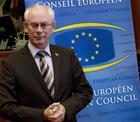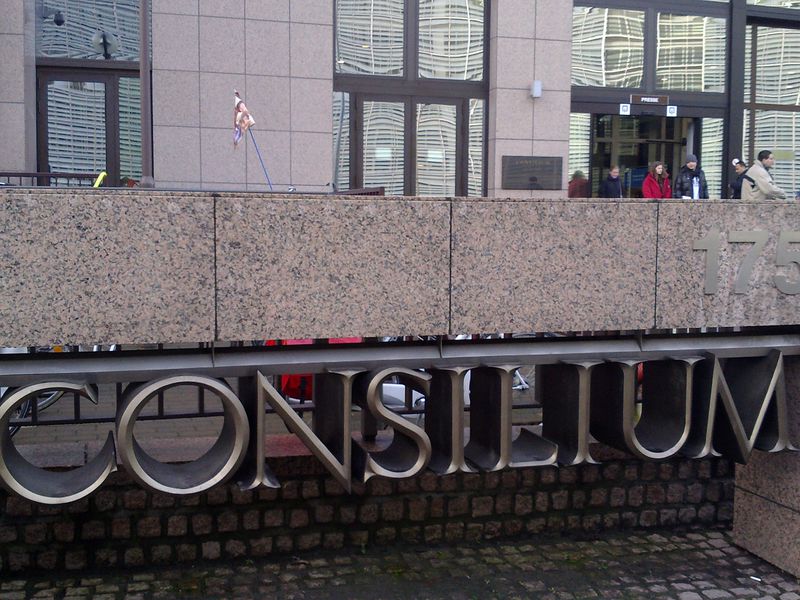Political Fireworks Against the Debt Crisis
Ralitsa Kovacheva, December 8, 2011
 Nothing is decided until everything is decided. European leaders must remember that while discussing their ideas for changing the governance of the Union and especially of the euro area. Because at this stage it appears that, while trying to find lasting political solutions they are focused more on the form than on the substance. And the ultimate goal - resolving the current crisis, seems completely overshadowed by the palaver on treaty changes.
Nothing is decided until everything is decided. European leaders must remember that while discussing their ideas for changing the governance of the Union and especially of the euro area. Because at this stage it appears that, while trying to find lasting political solutions they are focused more on the form than on the substance. And the ultimate goal - resolving the current crisis, seems completely overshadowed by the palaver on treaty changes.
France and Germany have contributed by sending the president of the European Council a letter with their proposals for reform. In turn, Herman Van Rompuy, who was charged by EU leaders with the task to explore possibilities to strengthen economic governance, especially in the euro area, wrote a report and sent it to the leaders of the 27 countries on the eve of the European Council. The report, though confidential, "accidentally" leaked to the public domain.
Thus became clear the differences with the Franco-German proposal and accordingly - the potential conflict points. The first is that Van Rompuy's report clearly expresses the position of European institutions that whatever changes are discussed in the name of a "fiscal union", they should not destroy the integrity of the EU. Countries with a derogation, that are not yet members of the eurozone but will become such by virtue of their accession treaties, cannot be excluded from the negotiations, sources from the Council commented informally. At the same time, the changes must be done within the EU framework and to ensure the role of European institutions, rather than to seek an intergovernmental agreement in the eurozone. We already have this problem with the Treaty on the European Stability Mechanism (ESM), the sources reminded.
Germany also believes that the best option is changes to be approved by all 27  countries and to strengthen the role of the European Commission, but it does not exclude the reserve option for an intergovernmental agreement like the Euro Plus Pact, open to non-euro area countries. France openly prefers the intergovernmental approach, as demonstrated by President Nicolas Sarkozy's speech.
countries and to strengthen the role of the European Commission, but it does not exclude the reserve option for an intergovernmental agreement like the Euro Plus Pact, open to non-euro area countries. France openly prefers the intergovernmental approach, as demonstrated by President Nicolas Sarkozy's speech.
Another major difference is the approach to achieving the goals.While Germany insists explicitly on Treaty changes, President Van Rompuy rather seeks ways to circumvent them or at least to apply the simplified procedure. This has already been used for the creation of the European Stability Mechanism. The advantage is that neither a Convention nor an Intergovernmental conference is needed, which means that it can be done relatively quickly.
Van Rompuy's report examines ways to strengthen economic governance in the EU and the euro area in particular in three main areas: budgetary discipline, economic union and crisis mechanisms. The easiest way, according to the document, to address the issue of strengthening the discipline is through a change of Protocol №12 to the Treaty so countries to be required to enrol a balanced budget rule in their constitutions. Protocol №12 refers to the excessive deficit procedure and states the permissible levels of debt and deficit. The Court of Justice would have the right to control how the rule is transposed at national level. "This rule should be complemented with an automatic correction mechanism (for example automatic reductions in expenditures, increases in taxes or a combination of both)," the report said.
And very importantly: "Euro area Member States should report ex-ante on their national debt issuance and a centralised recording and monitoring of all general government debt issuance at euro area level should be undertaken." The advantage of this approach is that Protocol № 12 can be changed with a unanimous decision of the Council, after consulting the European Parliament and the European Central Bank, without ratification at national level. The report calls on the Council and Parliament to adopt such changes rapidly, together with the Commission's proposals from 23 November on the budgetary discipline of the eurozone.
Additional effects can be achieved by increasing automation in terms of the excessive deficit procedure (EDP) for euro area members by applying the reversed majority rule. This means that unlike the classical case, the Council will not have to confirm but to reject a Commission proposal by a qualified majority. This principle has been introduced in many respects in the so called 'Six Pack' on the EU economic governance, but not to the excessive deficit procedure, precisely because it requires a Treaty change.
In the same context, stronger powers of the institutions can be ensured to intervene in the event of a failure to meet recommendations under the EDP - for example, the Commission or the Council (Eurogroup) to request changes to the draft budgets of the eurozone countries before being submitted to national parliaments. When countries under assistance programmes fail to comply this would lead to ex-ante approval of all major economic reforms by the Commission. The Commission's proposals from 23 November are in the same vain.
Through a change of Protocol №14 to the Treaty, which refers to the Eurogroup, the proposed regular meetings of heads of state and government of eurozone countries can be legalised. According to France and Germany, these should be held once a month, representing "an economic governance body” of the euro area. Under Article 48 of the Treaty of the EU (TEU), the listed changes could be done through the simplified revision procedure, with the argument that there is no transfer of new competences to the Union. The simplified procedure does not require Convention or Intergovernmental Conference (IGC), but requires ratification by all 27 member states.
 As for the economic union, President Van Rompuy proposes to use the form of enhanced cooperation between the eurozone countries in areas such as labour market, pension and insurance systems and tax coordination. In fact, he suggests the creation of economic Schengen in the euro area: "In the context of a possible Treaty change, a similar mechanism to that that already exists in the area of Freedom, Security and Justice could be introduced to accelerate the recourse to enhanced cooperation". Of course, this must not undermine the internal market, the report states, although without explaining how exactly the integrity of the internal market will be ensured. In the same context, President Van Rompuy mentions the possibility “of moving towards common debt issuance in a staged and criteria-based process, for example starting with the pooling of some funding instruments.”
As for the economic union, President Van Rompuy proposes to use the form of enhanced cooperation between the eurozone countries in areas such as labour market, pension and insurance systems and tax coordination. In fact, he suggests the creation of economic Schengen in the euro area: "In the context of a possible Treaty change, a similar mechanism to that that already exists in the area of Freedom, Security and Justice could be introduced to accelerate the recourse to enhanced cooperation". Of course, this must not undermine the internal market, the report states, although without explaining how exactly the integrity of the internal market will be ensured. In the same context, President Van Rompuy mentions the possibility “of moving towards common debt issuance in a staged and criteria-based process, for example starting with the pooling of some funding instruments.”
The third element of Van Rompuy's proposal is to strengthen the crisis mechanisms. Here, although there are not many details, we can see interesting signs. The President calls for the ESM treaty to be finalised and ratified rapidly, with some significant changes. For example, the decision making procedure with unanimity should be limited to a narrow range of issues and to be replaced with a majority of 85% like in the IMF.
The other change needed is the ESM to be entitled to recapitalise banks directly (under current conditions it is entitled to allocate funds only to states) and respectively – to have the necessary characteristics of a credit institution. And in order to restore market confidence, it has to be emphasised again that the Greek debt restructuring will be the sole and exclusive event, which will not be repeated. This emphasis was placed also by the leaders of France and Germany, indicating a softening of the German position regarding the private sector participation.
Another important sign is the proposal “to review the clause limiting the consolidating ESM and EFSF lending capacity to EUR 500 billions”. At this stage, however, officials in Brussels refrain from commenting on whether this means an increase of contributions or guarantees provided by member states or the fund will rely on the new tools to attract private investors to the EFSF, approved by the Eurogroup on 29 November. In the same vein is also the reminder that the IMF must have sufficient resources to deal with the crises as the increase should be achieved mostly through bilateral loans. These proposals suggest that regardless of political decisions, European leaders are preparing for a scenario to fight the debt crisis with new rescue loans.
Given all this, we can hardly expect from this European Council summit to deliver  final decisions on all issues. However, journalists in Brussels are insistently asking a very relevant question: what is the minimum to be achieved in order to have a "fiscal union" or a “fiscal compact”, according to ECB President Mario Draghi. At this stage none of these proposals seem sufficient to meet this claim. Unofficially, an official representative in Brussels summarised the situation: "We need something substantive enough, fast enough and secure enough to impress the markets."
final decisions on all issues. However, journalists in Brussels are insistently asking a very relevant question: what is the minimum to be achieved in order to have a "fiscal union" or a “fiscal compact”, according to ECB President Mario Draghi. At this stage none of these proposals seem sufficient to meet this claim. Unofficially, an official representative in Brussels summarised the situation: "We need something substantive enough, fast enough and secure enough to impress the markets."
However, nothing is decided until everything is decided. And the battle is yet to start.
 Klaus Regling | © Council of the EU
Klaus Regling | © Council of the EU Mario Centeno | © Council of the EU
Mario Centeno | © Council of the EU Mario Centeno | © Council of the EU
Mario Centeno | © Council of the EU | © euinside
| © euinside